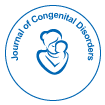Our Group organises 3000+ Global Conferenceseries Events every year across USA, Europe & Asia with support from 1000 more scientific Societies and Publishes 700+ Open Access Journals which contains over 50000 eminent personalities, reputed scientists as editorial board members.
Open Access Journals gaining more Readers and Citations
700 Journals and 15,000,000 Readers Each Journal is getting 25,000+ Readers
Useful Links
Recommended Journals
Share This Page
Phenylketonuria
Phenylketonuria (PKU) is a is a rare inherited disorder that causes an amino acid called phenylalanine to build up in your body. PKU is caused by a defect in the gene that helps create phenylalanine hydroxylase. When this enzyme is missing, the body is unable to break down phenylalanine. This causes a buildup of phenylalanine in the body. Early diagnosis and treatment can help relieve symptoms of PKU and prevent brain damage. Only 1 in 10,000 to 15,000 newborns affecting each year with Phenylketonurina. The signs and symptoms of PKU vary from mild to severe. The most severe form of this disorder is known as classic PKU. Infants with classic PKU appear normal until they are a few months old. Without treatment, these children develop permanent intellectual disability. Seizures, delayed development, behavioral problems, and psychiatric disorders are also common. Untreated individuals may have a musty or mouse-like odor as a side effect of excess phenylalanine in the body. Children with classic PKU tend to have lighter skin and hair than unaffected family members and are also likely to have skin disorders such as eczema. Less severe forms of this condition, sometimes called variant PKU and non-PKU hyperphenylalaninemia, have a smaller risk of brain damage. People with very mild cases may not require treatment with a low-phenylalanine diet

 Spanish
Spanish  Chinese
Chinese  Russian
Russian  German
German  French
French  Japanese
Japanese  Portuguese
Portuguese  Hindi
Hindi